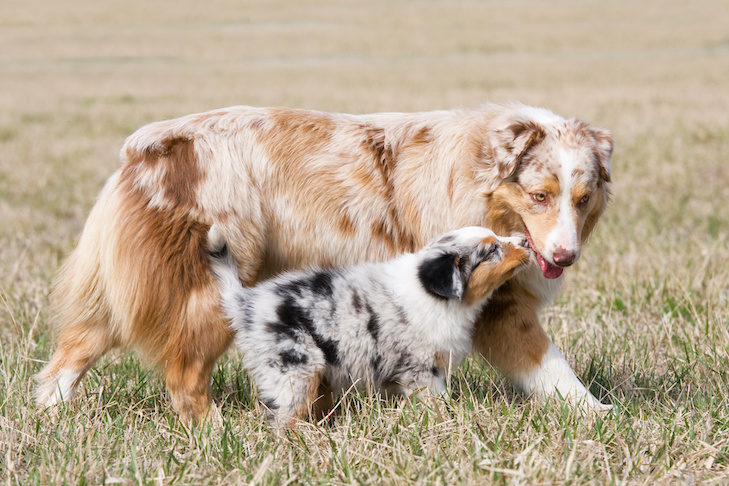Merle Cocker Vs Non-Merle Variations in Cocker Spaniel Colors

Merle Cocker Vs Non-Merle: Ever wondered how your spaniel got its blotched colors? Could there be some designer test that has been carried out to give your Cocker that rainbow-like hue, well you are in the right place for answers.
Spaniels aren’t the only ones possessing color variations to their coat, many furry canines like the Saint Bernard and poodle have also been seen with different color patches in their coat, so what exactly causes these markings? The answer lies in their Merle
Think of Merle as a piece of information in your dog’s DNA responsible for altering the regular color of your dog’s skin. This information or gene as it is called if present in your pup spaniel’s parent in high proportion will in the long run give them that distinctive blotch some are known for.
The two forms of Merle are the Dominant Merle(M) and the recessive Merle (m) are both present in the gene of every spaniel, when the dominant merle comes before the recessive merle you get an (Mm), and the distinctive coloration present in your Spaniel. The reverse is the case when the recessive spaniel comes first.
Health Consideration for Merle Cocker Spaniel
As a result of the Dominant Merle Gene coming before the recessive Merle, your spaniel must likely have those color markings common with canines carrying them.
Unfortunately, spaniels with a heavy dose of the M gene that leads to the coloration are very prone to health issues and sometimes fatal conditions (especially those with a double MM).
These conditions include but not limited to:
- Blindness.
- Ear Problems (deafness)
- Skin problems etc.
Ideally, it is advisable to ensure that your Merle spaniel cocker is properly groomed and given the best medication needed to maintain its longevity.
More so. Before buying a spaniel, getting a spaniel without two dominant Merle genes should be a top priority since this prevents extreme cases where your pups find it difficult to see.
The American Kernel Association frowns at breeders mixing parents having both dominant Merle in their genetics from mating, you could check in with the association if you decide to get a cocker with these traits.
Finding a Merle Cocker, Spaniel Breeder: Tips and Recommendations
Medically, the best recommendation is to get Merle Cocker whose predecessor has little to no traces of the M gene.
In addition, the following suggestion will be handy when choosing a spaniel breeder:
Choose Breeders with little or no M variation
Even if you like the blotched and spotted skin color of dogs, check in with breeders who take care of not breeding breeds having similar genes as this will over time help you manage their health.
Less Health Problems
Check-in with breeders who practice extensive grooming and dog care to avoid common canine diseases; be sure to validate that your cocker looks healthy and well-fed before buying.
Choosing Traditional Merlene Breed
In case you can’t help but have one of those spotted little furry spaniels, you should ensure that the breeder has only a traditional merle breed. Breeds like the Australian Shepherd Spaniel are among the species with a naturally occurring spot with less effect on their health.
Health Guarantee
Traditional breeders also provide a health guarantee and basic medication if your pups come down with minor illness, make sure to check this out before bringing your Cocker spaniel home.
Training and Caring For your Merle Cocker Puppies
The best thing you can do for your merle cocker is to care for them, and while they may be susceptible to health issues, proper care prevents these problems from escalating.
Basic health care like grooming, proper nutrition, outdoor activities, etc. can ensure your Merle spaniel lives to a ripe old age.
Keep Training Short
No doubt, your merle pups enjoy being trained; walks, sitting up, and other instructional exercise routine will boost their vitality, keeping it short is the end game.
Setting intervals in their exercise routine will help engage and maintain the vigor needed to complete a session, your spaniel at a young age will be adventurous and will have issues following long a set of routines, however with breaks in between exercises, you can get them completing their rounds.
Be Patient with Your Pups
Excessive energy and high zeal can make your spaniel somewhat flighty, making them easily lose interest in any activity requiring a long time commitment.
Being able to forebear will make the difference needed for the successful health of your merle cooker, as a pet parent, you will have to gradually train them until muscle memory is built.
Spaniels by nature possess a very strong sense of smell, love water, and high high-engaging activities, hence part of their exercise routine should include games around their natural skills.
Teaching your spaniel cocker how and where to use the toilet, and feeding them right are other healthy ways to care for them.
How long does Merle Spaniel live?
Despite their disease susceptibility, your spaniel all things being equal can live up to 15 years.
However, spaniels with health issues can live as high as 12 years if their health challenges are being followed up with proper medications.
Is a Merle Cocker the same as a Roan?
The striking difference between a roan and a merle cocker is in the time they get to have their skin pigmentation.
Most Merle exhibits their coloration at a young age and gradually becomes permanent on their coat as they age. Whereas Roan tends to have a unified color until their second month when their skin coat starts to shed other colors.
Simply put, your merle cocker starts showing off its coloration earlier than your roan pup.
To Wrap Up
Merle Cocker spaniel pups may not be the healthiest dog breed, but ensuring that a regular dose of medication, the right personal hygiene, and other beneficial things to help them manage their condition is met will go a long way to see that they live sickness-free.
If you find this article informative, do well to leave a comment below and check out other articles in the section.






